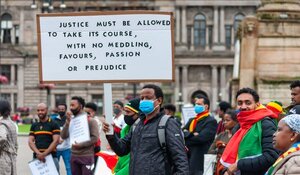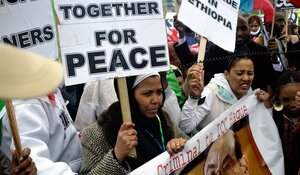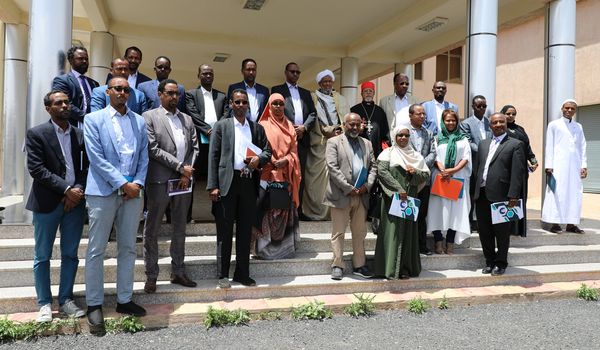Following the downfall of the feudal system in 1974, Ethiopia has experienced the most repressive regime under the leadership of the military junta called the ‘Dergue’ for more than a decade. The notorious, state-sponsored ‘red terror’ - a period of systematic repression by the government against any other political groups which were considered as enemies of the revolution - has claimed tens of thousands of lives and many became victims of enforced disappearance on the ground of political ideology. This repressive rule was overthrown in 1991 by the coalition of guerrilla fighters but only to be replaced by a brand-new authoritarian regime which is known for its massive violations of human rights and ruled the country with the iron fist for 27 years; hence the cycle of violence has continued.
However, much has been expected when in April 2018, as a response to mounting pressures from both within and without the country, the government decided to make fundamental reforms and liberalisation of the political atmosphere. Yet, to the dismay of many observers, no effective accountability mechanisms have been put in place.
The Ethiopian society is deeply divided more than ever due to institutionalised prejudices that resulted from ethnicity-based federalism, divergent historical narratives, and polarised political system. To add insult to already existing injury, impunity for the most serious crimes has become a norm and multiple opportunities to break with the past had been missed. Consequently, to heal the divided nation, ensure accountability and bring about reconciliation, Ethiopia should make use of transitional justice mechanisms.
Transitional Justice Mechanisms

In the past, various mechanisms had been put in place by different countries that experienced violence and gross human rights violations, to end impunity and ensure peace. These mechanisms ranged from national prosecutions, establishment of international tribunals or setting up hybrid tribunals at domestic level and to bringing perpetrators before the International Criminal Court. All these avenues, however, are exclusively concerned with ensuring criminal accountability by heavily relying on the European notion of retributive justice focusing on the punishment of perpetrators, with little or no attention paid for healing the nation. Nonetheless, with the advent of a transitional justice framework, new approaches to deal with past atrocities have emerged.
Transitional justice (TJ) has been defined in various ways and from different perspectives. But the widely used definition is provided by the United Nations Security Council (UNSC) whereby TJ is defined as ‘‘…the full range of processes and mechanisms associated with a society’s attempts to come to terms with a legacy of large-scale past abuses, in order to ensure accountability, serve justice and achieve reconciliation.’’ The notion of justice used in this transitional context is not limited to seek for a narrowly defined retributive justice; rather, it mainly relies on a restorative justice aimed at reconstructing the community. In the words of Desmond Tutu, the African way of understanding justice is more of restorative, it means the restoration of broken social relationship rather than simply punishing the perpetrators.
What makes TJ attractive for societies in a democratic transition, is its unique potential of serving twin purposes: ensuring accountability and achieving societal reconciliation. And certainly, its success depends on the contexts of each society and the specific strategies applied. Among the TJ mechanisms devised to confront past atrocities, the establishment of a Truth and Reconciliation Commission (TRC) is by far the most popular.
The Ethiopian Reconciliation Commission and Its Challenges

In an effort to end the cycle of violence, Ethiopia has established a Reconciliation Commission, with the objectives of maintaining peace, justice, national unity and consensus and also reconciliation among Ethiopian peoples. It is composed of 18 members (of which 7 are women), with diverse background, in terms of religion, ethnicity, experience, age and above all, gender. Thus, it is safe to conclude that the Commission is gender inclusive, even though its gender sensitivity remains to be seen. In carrying out its ambitious tasks, the Commission will face, among others, three formidable challenges: legitimacy problems, the complex nature and different narratives of “truth”, and the peace vs. justice dilemma.
Above all, the actual and perceived legitimacy of a TRC is paramount for it to accomplish its goals effectively, independently, and transparently. Despite its diversity, the legitimacy of the Ethiopian Reconciliation Commission is highly compromised for the reason that the members were hand-picked by the ruling party and above all, the Commission shall be accountable to the Prime Minister as provided under Article 3 of the establishment proclamation. More importantly, the former overthrown government perceives the entire process as victor’s justice and has given no recognition to the Commission.
The second demanding task for the Commission is unravelling the truth. As it has been widely discussed in academic circles and practitioners of peace making, truth is an inherently contested value and arguably, ‘‘all that a truth commission can achieve is to reduce the number of lies that can be circulated unchallenged in public discourse’’, as Michael Ignatieff pointed out. In the country where every ethnic group have their own narratives, it is hardly possible to come up with a truth acceptable to all. As such, the Commission must focus on factual truth and leave narrative truth for experts to inquiry.
The last but not least challenge facing the Commission is reconciling the competing values of justice and peace. In the process of coming to terms with the past, the moral dilemma of achieving peace and justice could arise. That is to say, in the process of supporting justice old wounds might open up and conflict may re-occur, which may disrupt the transition. Nonetheless, the experiences of other countries show that any peace, which is attained by forgetting the past and compromising justice is unsustainable.
In conclusion, Ethiopia needs reconciliation before election. To bring about reconciliation and ensure lasting peace, contested historical narratives, particularly the version of history circulated in public and education, need to be bridged through sustainable dialogue and expert findings; it should be noted that there is no sustainable peace without justice; and resilient institutions should be built to safeguard a democratic system. To this end, the Reconciliation Commission should be restructured with a view to help a democratic transition in Ethiopia (16 September 2020).

